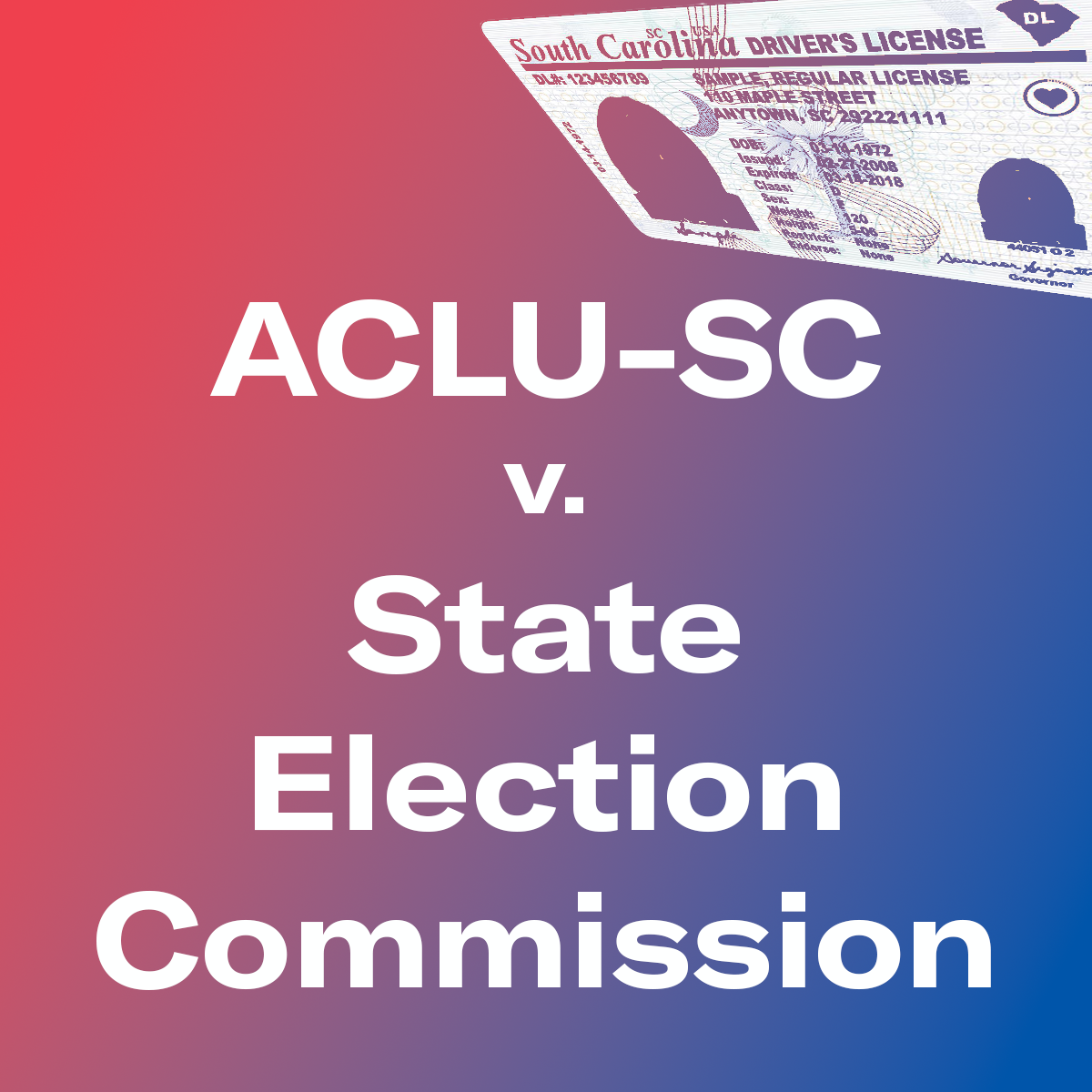ACLU-SC v. State Election Commission
- Filed: 10/22/2024
- Status: Advancing liberty
- Court: Richland County Court of Common Pleas
- Latest Update: Oct 22, 2024

The South Carolina Department of Motor Vehicles and State Election Commission unlawfully denied voter registration opportunities to South Carolinians who will have reached the legal voting age of 18 by Election Day 2024.
The ACLU and ACLU of South Carolina filed a lawsuit on October 22, 2024, asking the circuit court to order the Election Commission to add the wrongfully excluded voters to the state’s voter rolls.
Under a section of the National Voter Registration Act known as the “Motor Voter” provision, the South Carolina Department of Motor Vehicles (SCDMV) is supposed to provide all customers the opportunity to register to vote when they apply for a new or renewed ID card or driver’s license. And under South Carolina law, 17-year-old citizens may register to vote as long as they turn 18 on or before the next general Election Day and are otherwise qualified to vote.
An inquiry by the ACLU of South Carolina, however, has revealed that SCDMV has systematically failed at transmitting the correct information that would allow the South Carolina Elections Commission to complete these voters' registration.
Specifically, when a South Carolinian applies for a new or renewed driver’s license or other ID from the SCDMV — whether in person, online, or by phone, mail, or email — the SCDMV must give that person an opportunity to register to vote or update their voter registration. If the customer indicates they want to register or update their voter registration, the SCDMV must transmit that information via the State Election Commission to the county board of elections, usually within 10 days.
When an SCDMV customer fills out a driver’s license or state identification application, Box 5 of the Form 447-NC asks: “Do you want to register to vote in South Carolina with the County Registration Board?” It further instructs that, to register to vote, “[y]ou must be a U.S. citizen, SC resident and meet requirements to register to vote.” Customers are then given an opportunity to check a box to indicate “Yes, I wish to register to vote.”
In most cases, if someone checks “Yes” on this form, they are then prompted to attest to their voter qualifications with an electronic signature, and their information is transferred to the State Election Commission for voter registration. But in the case of 17-year-olds who should have qualified under the South Carolina Constitution, the SCDMV has been failing to provide the electronic signature form and to transmit the information to the SEC.
Because the SCDMV has been systematically failing to register 17-year-olds for at least 22 years, the total number of potential voters who were denied the chance to register in accordance with the NVRA is not yet known.
Why this case?
We took on this case because it’s about fundamental voting rights. In particular, we are talking about the rights of young voters who plan to vote for the first time in their lives.
This case involves state and federal laws. Under South Carolina law, individuals who are 17 years old may register to vote and vote in primary elections as long as they (1) will turn 18 on or before the next general election day, and (2) otherwise meet the qualifications for voting (S.C. Code § 7-5-180).
Under the National Voter Registration Act, “Each state motor vehicle driver’s license application … serves as an application for voter registration.” The NVRA is commonly referred to as the “Motor Voter” law.
On October 25, a judge in Richland County Court denied our motion for a temporary restraining order. This ruling did not end the case. The ACLU-SC, along with the League of Women Voters of South Carolina and the South Carolin NAACP, sought permanent relief from the SCDMV’s unlawful exclusion of 17-year-olds from the National Voting Rights Act “Motor Voter” provision.
The latest
On March 27, 2025 the DMV’s general counsel informed the ACLU-SC that the department had adjusted the settings in its customer management software so that it now captures and transmits voter registration information for individuals age 16 and up. Young voters can now register at the DMV in accordance with state and federal law.
- 10/22/2024 Summons and Complaint (10/22/2024)
- 10/22/2024 Motion (10/22/2024)
- 10/22/2024 Supplement to Motion (10/24/2024)
- 10/22/2024 Exhibit AA (10/24/2024)
- 10/22/2024 Exhibit BB (10/24/2024)
- 10/22/2024 Exhibit CC (10/24/2024)
Date Filed: 10/22/2024
Court: Richland County Court of Common Pleas
Affiliate: SC
Download documentDate Filed: 10/22/2024
Court: Richland County Court of Common Pleas
Affiliate: SC
Download documentDate Filed: 10/22/2024
Court: Richland County Court of Common Pleas
Affiliate: SC
Download documentDate Filed: 10/22/2024
Court: Richland County Court of Common Pleas
Affiliate: SC
Download documentDate Filed: 10/22/2024
Court: Richland County Court of Common Pleas
Affiliate: SC
Download documentDate Filed: 10/22/2024
Court: Richland County Court of Common Pleas
Affiliate: SC
Download documentLearn More About the Issues in This Case
Stay Informed
Sign up to be the first to hear about how to take action.
By completing this form, I agree to receive occasional emails per the terms of the ACLU’s privacy statement.
By completing this form, I agree to receive occasional emails per the terms of the ACLU’s privacy statement.
